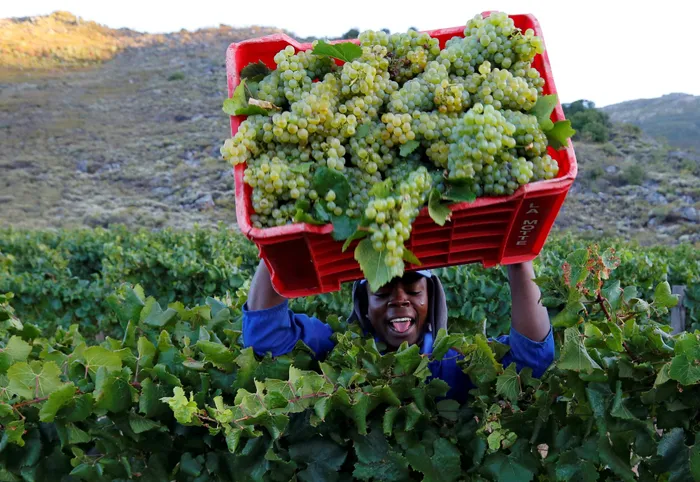South Africa's agricultural exports surged by 10% in first quarter of 2025

A worker harvests grapes on a farm in Franschhoek near Cape Town. South Africa’s agricultural exports have shown strong growth in the first quarter of 2025 due to the higher export volumes of grapes among other products.
Image: Independent Newspapers Archives
South Africa’s agricultural exports have shown strong growth in the first quarter of 2025, rising by 10% year-on-year and reaching a total of US$3.36 billion, according to Agriculture Minister John Steenhuisen.
This increase was largely driven by higher export volumes of products such as grapes, maize, apples, and wine, alongside improved international commodity prices.
The minister said: “We can all agree that agriculture plays a vital role in our nation’s economic ambitions and contributes significantly to our trade balance.” He attributed the growth in exports to the “unwavering dedication and courageousness of the country’s farmers and the entire value chain.”
The export success comes as the agricultural sector continues its gradual recovery on the jobs front. The recent Statistics SA Quarterly Labour Force Survey, released in May, showed that primary agriculture employment rose by 1% from the previous quarter, reaching 930,000 jobs in the first quarter of 2025. The increase was mainly seen in the field crops, game, and hunting subsectors.
While annual employment was still down by 1% year-on-year, Steenhuisen expressed optimism about the direction the sector is heading in: “This mild recovery in employment is a welcome sign, and the Department of Agriculture is committed to implementing interventions to support the subsectors and regions still feeling the effects of previous challenges.”
With June marking Youth Month, Steenhuisen also used the opportunity to call for greater involvement of young people in agriculture to ensure the sector’s long-term sustainability.
“The future of our country and that of our agricultural sector hinges on the active involvement of our young people. We need to ignite a passion for farming, agribusiness, and the entire agricultural value chain among our youth,” he said.
He outlined key areas that need investment to attract young talent, including accessible financial assistance, early agricultural education, land access, market linkages, and technology-driven farming.
“The energy, innovation, and adaptability of our young citizens are precisely what our agricultural sector needs to reach its full potential and ensure lasting food security,” said Steenhuisen.
Applications for the Department of Agriculture’s bursary programme for the 2026 academic year are now open.
Related Topics: